Related Research Articles

In certain Christian denominations, holy orders are the ordained ministries of bishop, priest (presbyter), and deacon, and the sacrament or rite by which candidates are ordained to those orders. Churches recognizing these orders include the Catholic Church, the Eastern Orthodox, Oriental Orthodox, Anglican, Assyrian, Old Catholic, Independent Catholic and some Lutheran churches. Except for Lutherans and some Anglicans, these churches regard ordination as a sacrament. The Anglo-Catholic tradition within Anglicanism identifies more with the Roman Catholic position about the sacramental nature of ordination.

The Presbyterian Church of the United States of America, abbreviated Presbyterian Church (USA) or PC(USA), is a mainline Protestant denomination in the United States. It is the largest Presbyterian denomination in the US, and known for its liberal stance on doctrine and its ordaining of women and members of the LGBT community as elders and ministers. The PC(USA) was established by the 1983 merger of the Presbyterian Church in the United States, whose churches were located in the Southern and border states, with the United Presbyterian Church in the United States of America, whose congregations could be found in every state. The similarly named Presbyterian Church in America is a separate denomination whose congregations can also trace their history to the various schisms and mergers of Presbyterian churches in the United States. Unlike the PCA, the PC(USA) supports evangelical feminism and supports practise of same gender marriages. It also welcomes gay and lesbian persons to serve in leadership positions as ministers, deacons, elders, and trustees.

A deacon is a member of the diaconate, an office in Christian churches that is generally associated with service of some kind, but which varies among theological and denominational traditions. Major Christian churches, such as the Catholic Church, the Oriental Orthodox Churches, the Eastern Orthodox Church, the Scandinavian Lutheran Churches, the Methodist Churches, the Anglican Communion, and the Free Church of England, view the diaconate as an order of ministry.

Ordination is the process by which individuals are consecrated, that is, set apart and elevated from the laity class to the clergy, who are thus then authorized to perform various religious rites and ceremonies. The process and ceremonies of ordination vary by religion and denomination. One who is in preparation for, or who is undergoing the process of ordination is sometimes called an ordinand. The liturgy used at an ordination is sometimes referred to as an ordination.

Matura or its translated terms is a Latin name for the secondary school exit exam or "maturity diploma" in various European countries, including Albania, Austria, Bosnia and Herzegovina, Bulgaria, Croatia, the Czech Republic, Hungary, Italy, Kosovo, Liechtenstein, Montenegro, North Macedonia, Poland, Serbia, Slovakia, Slovenia, Switzerland and Ukraine.

The Presbyterian Church in America (PCA) is the second-largest Presbyterian church body, behind the Presbyterian Church (USA), and the largest conservative Calvinist denomination in the United States. The PCA is Reformed in theology and presbyterian in government. It is characterized by a blend of Calvinist practice and broad evangelicalism.
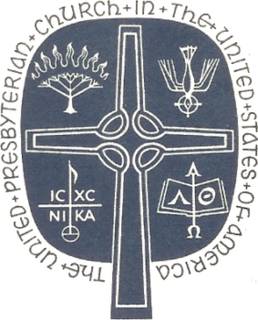
The United Presbyterian Church in the United States of America (UPCUSA) was the largest branch of Presbyterianism in the United States from May 28, 1958, to 1983. It was formed by the union of the Presbyterian Church in the United States of America (PCUSA), often referred to as the "Northern" Presbyterian Church, with the United Presbyterian Church of North America (UPCNA), a smaller church of Covenanter-Seceder tradition at a conference in downtown Pittsburgh, Pennsylvania, in May 1958. Vigorous ecumenical activity on the part of PCUSA leaders led to this merger, something of a reunion of two long-separated branches of the larger Presbyterian family deriving from the British Isles.

The Presbyterian Church in the United States of America (PCUSA) was the first national Presbyterian denomination in the United States, existing from 1789 to 1958. In that year, the PCUSA merged with the United Presbyterian Church of North America, a denomination with roots in the Seceder and Covenanter traditions of Presbyterianism. The new church was named the United Presbyterian Church in the United States of America. It was a predecessor to the contemporary Presbyterian Church (USA).
Presbyterian Church (U.S.A.) seminaries are educational institutions run by the Presbyterian Church (USA), geared primarily towards the training of ministers. The seminaries are independent institutions but relate dynamically to the PC(USA) through the Committee on Theological Education, a committee of seminary presidents and ministers and elders from across the PC(USA). The Theological Education Fund (TEF) is the only denomination-wide funding system to support the schools.
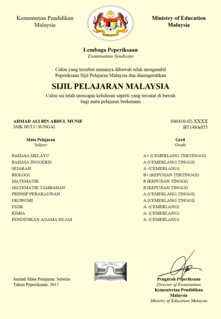
The Sijil Pelajaran Malaysia (SPM), or the Malaysian Certificate of Education, is a national examination taken by all fifth-form secondary school students in Malaysia. It is the equivalent of the General Certificate of Secondary Education (GCSE) of England, Wales and Northern Ireland, the Nationals 4/5 of Scotland, and the GCE Ordinary Level of the Commonwealth of Nations. It is the leaving examination of the eleventh grade of schooling.

Erskine Theological Seminary is an institution of graduate theological and pastoral education. The Seminary is based in Due West, South Carolina, United States, and also offers classes at a second degree-granting campus in Columbia, South Carolina. Erskine Seminary operates an extension site in Greenville, South Carolina. Erskine Seminary is in the conservative Presbyterian tradition, and primarily prepares candidates for ordained Christian ministry]], as well as pastoral counselors, and candidates for Licensed Professional Counselor. The Seminary – founded in 1837 – is now the graduate arm of Erskine College, a liberal arts college established in 1839 and affiliated with the Associate Reformed Presbyterian Church. The published mission of Erskine Theological Seminary is: "The mission of Erskine Theological Seminary is to prepare men and women to fulfill the Great Commission of Jesus Christ through theological higher education that is Biblical, ecclesial, and missional ."

The Fundamentalist–Modernist controversy is a major schism that originated in the 1920s and '30s within the Presbyterian Church in the United States of America. At issue were foundational disputes about the role of Christianity, the authority of Scripture, the death, Resurrection, and atoning sacrifice of Jesus. Two broad factions within Protestantism emerged: Fundamentalists, who insisted upon the timeless validity of each doctrine of Christian orthodoxy, and Modernists, who advocated a conscious adaptation of religion in response to the new scientific discoveries and the moral pressures of the age. At first, the schism was limited to Reformed Protestantism (Calvinism) and centered about the Princeton Theological Seminary which has split into Westminster Theological Seminary, but it soon spread, affecting nearly every Protestant denomination in the United States. Denominations that were not initially affected, such as the Lutheran Church, eventually were embroiled in the controversy, leading to a schism in the Lutheran Church.
In Christianity, an elder is a person who is valued for wisdom and holds a position of responsibility and authority in a Christian group. In some Christian traditions an elder is an ordained person who serves a local church or churches and who has been ordained to a ministry of word, sacrament and order, filling the preaching and pastoral offices. In other Christian traditions, an elder may be a lay person serving as an administrator in a local congregation, or be ordained and serving in preaching or pastoral roles. There is a distinction between ordained elders and lay elders. The two concepts may be conflated in everyday conversation. In non-Christian world cultures the term elder refers to age and experience, and the Christian sense of elder is partly related to this.

Attitudes in Presbyterianism toward homosexuality vary, ranging from outright condemnation to complete acceptance.

Ordination is the process by which individuals are consecrated, that is, set apart as clergy to perform various religious rites and ceremonies such as celebrating the sacraments. The process and ceremonies of ordination varies by denomination. One who is in preparation for, or who is undergoing the process of ordination is sometimes called an ordinand. The liturgy used at an ordination is sometimes referred to as an ordinal.
Emma Elizabeth Richards was the first Mennonite woman to be ordained as a pastor of a Mennonite congregation.
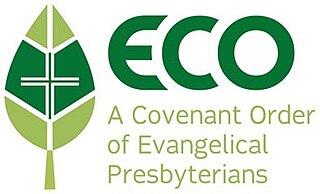
ECO: A Covenant Order of Evangelical Presbyterians is an evangelical Presbyterian denomination in the United States. As a Presbyterian church, ECO adheres to Reformed theology and Presbyterian polity. It was established in 2012 by former congregations and members of the Presbyterian Church (USA), abbreviated PC(USA). Dissatisfaction with the declining membership of the PC(USA) along with growing denominational disputes over theology—particularly ordination of practicing homosexuals as pastors and gay marriage—and bureaucracy led to the founding of ECO. In 2018, ECO has over 383 congregations, 103,425 covenant partners and over 500 pastors. ECO churches are egalitarian in beliefs and ordain women as pastors and elders.
The Presbyterian Church of the Philippines (PCP), officially The General Assembly of the Presbyterian Church of the Philippines, is a growing evangelical, Bible-based Reformed church in the Philippines. It was officially founded in 1987 and the General Assembly was organized in September 1996.
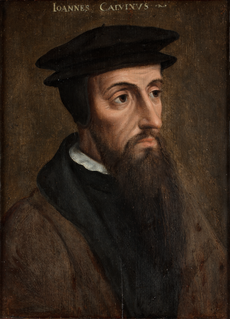
Presbyterianism has had a presence in the United States since colonial times and has exerted an important influence over broader American religion and culture.
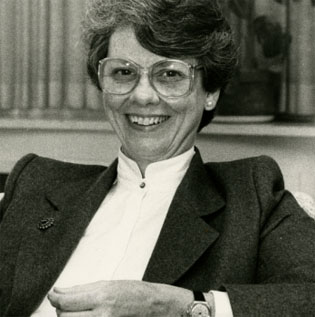
Eunice Blanchard Poethig was an American Presbyterian minister, national leader and educator. She served the Presbyterian Church (USA) as national Director of the Congregational Ministries Division, Executive Presbyter of Western New York, and Associate Executive of the Presbytery of Chicago, and spent fifteen years as an urban mission worker in the Philippines. She was one of a growing number of women ordained as clergy and appointed to prominent positions in the church, a trend that accelerated during her leadership in the 1980s and 1990s.
References
- ↑ "PC(USA) OGA". oga.pcusa.org. Retrieved 2020-10-19.